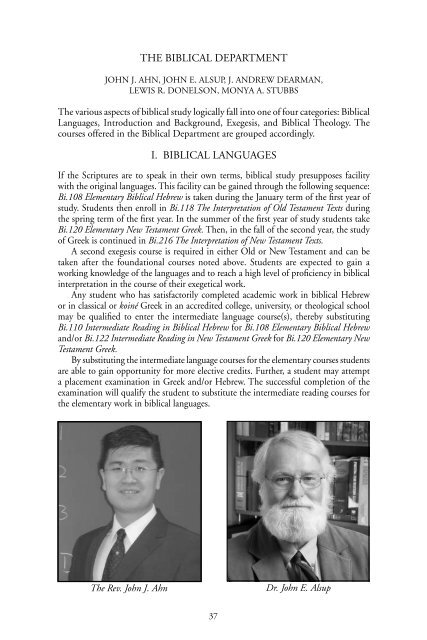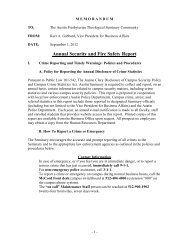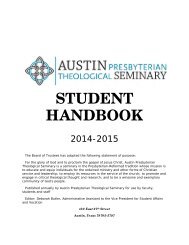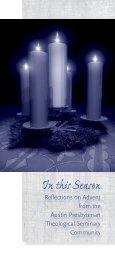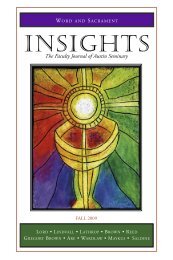Catalogue 2008 Book - Austin Presbyterian Theological Seminary
Catalogue 2008 Book - Austin Presbyterian Theological Seminary
Catalogue 2008 Book - Austin Presbyterian Theological Seminary
You also want an ePaper? Increase the reach of your titles
YUMPU automatically turns print PDFs into web optimized ePapers that Google loves.
THE BIBLICAL DEPARTMENT<br />
JOHN J. AHN, JOHN E. ALSUP, J. ANDREW DEARMAN,<br />
LEWIS R. DONELSON, MONYA A. STUBBS<br />
The various aspects of biblical study logically fall into one of four categories: Biblical<br />
Languages, Introduction and Background, Exegesis, and Biblical Theology. The<br />
courses offered in the Biblical Department are grouped accordingly.<br />
I. BIBLICAL LANGUAGES<br />
If the Scriptures are to speak in their own terms, biblical study presupposes facility<br />
with the original languages. This facility can be gained through the following sequence:<br />
Bi.108 Elementary Biblical Hebrew is taken during the January term of the fi rst year of<br />
study. Students then enroll in Bi.118 The Interpretation of Old Testament Texts during<br />
the spring term of the fi rst year. In the summer of the fi rst year of study students take<br />
Bi.120 Elementary New Testament Greek. Then, in the fall of the second year, the study<br />
of Greek is continued in Bi.216 The Interpretation of New Testament Texts.<br />
A second exegesis course is required in either Old or New Testament and can be<br />
taken after the foundational courses noted above. Students are expected to gain a<br />
working knowledge of the languages and to reach a high level of profi ciency in biblical<br />
interpretation in the course of their exegetical work.<br />
Any student who has satisfactorily completed academic work in biblical Hebrew<br />
or in classical or koiné Greek in an accredited college, university, or theological school<br />
may be qualifi ed to enter the intermediate language course(s), thereby substituting<br />
Bi.110 Intermediate Reading in Biblical Hebrew for Bi.108 Elementary Biblical Hebrew<br />
and/or Bi.122 Intermediate Reading in New Testament Greek for Bi.120 Elementary New<br />
Testament Greek.<br />
By substituting the intermediate language courses for the elementary courses students<br />
are able to gain opportunity for more elective credits. Further, a student may attempt<br />
a placement examination in Greek and/or Hebrew. The successful completion of the<br />
examination will qualify the student to substitute the intermediate reading courses for<br />
the elementary work in biblical languages.<br />
The Rev. John J. Ahn Dr. John E. Alsup<br />
37


